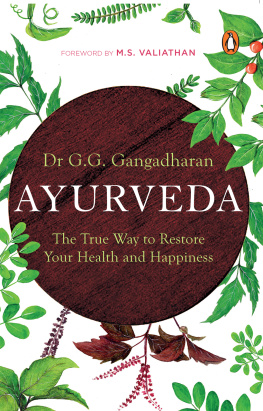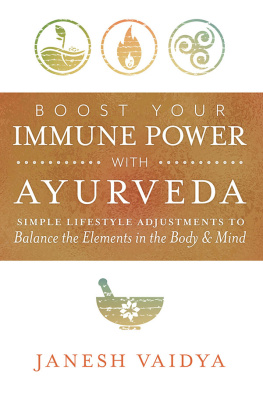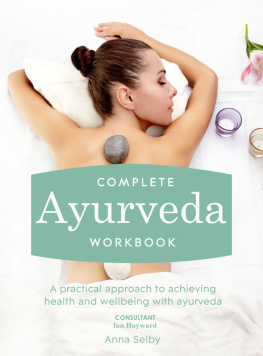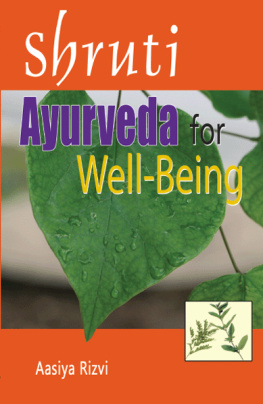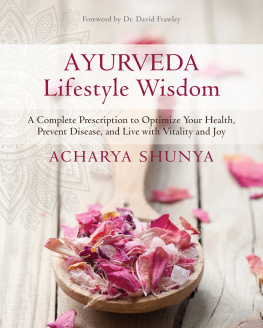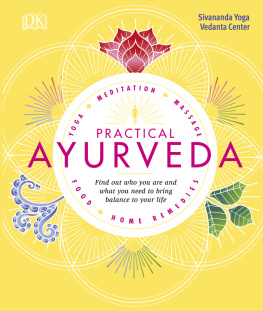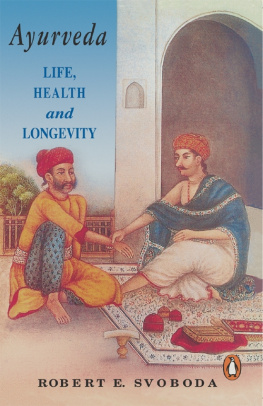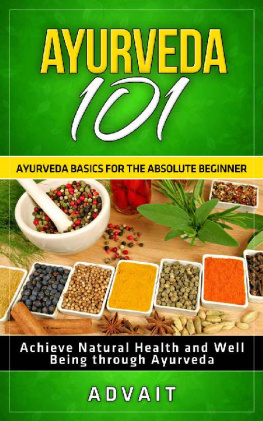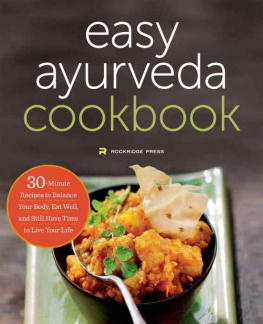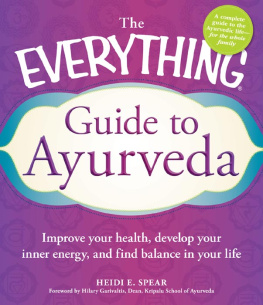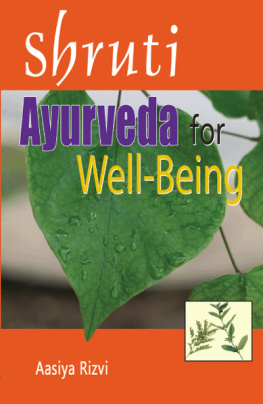Dr G.G. Gangadharan has been a champion of Ayurveda for the past three and a half decades. He is the author of ten research papers, twelve research articles, thirteen primary papers and six books. As a renowned expert on lifestyle diseases, he has conducted training programmes in the US, the UK, Germany, France, China, South Africa, Kenya, Nepal, Italy and Hong Kong, in addition to India. During his career, he has collaborated with social and corporate organizations, government think tanks, and international agencies that are interested in improving healthcare. After his seven-and-a-half-year Ayurvedacharya course from Coimbatore, Tamil Nadu, he acquired a masters degree from McGill University in Montreal, Canada. He is the recipient of the prestigious Ashoka Innovators for the Public fellowship. He also has a PhD from Tilak Maharashtra Vidyapeeth, Pune, in management of rheumatoid arthritis.
ADVANCE PRAISE
Health and happiness are interconnected. Happiness is accomplished with good health. Ayurveda is a science of life that advocates the art of living happily and holistically, guiding us towards wellness in all dimensions of the physical, mental and spiritual sphere to become better people. Dr Gangadharan has commingled this fact and come up with an intriguing treatise in the form of this bookVaidya Rajesh Kotecha, secretary, Ministry of AYUSH
Ayurveda by Dr G.G. Gangadharan is a refreshingly new take on the oldest medical tradition in the world. It strikingly illustrates the contemporary relevance of Ayurveda at a time when the world is fighting an unprecedented war against a global pandemic while undergoing an epidemiological transition towards multifactorial morbidity. As a scientist, I have been inspired and fascinated by the sophistication and depth of Ayurvedic concepts, such as doa, rasayana and agni. I believe this book will invoke similar interest and inquisitiveness among readers to know more about health, healing and wellness. The book, written in lucid language, may be of interest to a wide range of readers, including scientists, students and homemakers, as well as those seeking simple health tips and knowledge on this ancient science of healingDr Bhushan Patwardhan, national research professor, Ministry of AYUSH, and former vice chairman of the University Grants Commission, New Delhi
Creating a beginners guide to essential scientific Ayurveda practices is a great idea. Dr G.G. Gangadharans idea to look at the human body as an intelligent system reflects his out-of-the-box thinking regarding health, where happiness comes eventually. With a legacy of 5000 years, Ayurveda has always been a defender of our well-being. And today, to help the body keep up with a fast-paced world, we certainly need a time-tested defender rather than an experimental one. This book will certainly introduce you to this time-tested defender, AyurvedaVaidya Jayant Deopujari, chairman, board of governors, Central Council of Indian Medicine, Ministry of AYUSH; guru, Rashtriya Ayurveda Vidyapeeth (National Academy of Ayurveda), New Delhi
To
M.R. Jayaram, for his unwavering support and guidance in my endeavours, including this book. I could not have written this book without his constant advice and encouragement
Dr Jayaram-ji is a spiritual leader, dharmadikari of the Kaiwara temples and the chairman of Gokula Education Foundation (GEF), which leads the Ramaiah Group of Institutions
My pranam to you, sir
Foreword
Dr Gangadharan is a reputed Ayurveda physician, scholar, author and researcher, and a renowned expert in lifestyle diseases. This volume, titled Ayurveda, is his attempt, based on long professional experience, to convey the message of Ayurveda to a global readership. This quintessential message is that the mission of Ayurveda goes beyond the remediation of illness and seeks true restoration of the physical, mental and spiritual well-being of individuals. He also points out that the restorative process of Ayurveda is always done in harmony with manifestations of nature in time, habitat, fauna and flora, and unceasing interactions between the individual and the environment.
A traditional Ayurveda physician trained in the rigorous programme at Coimbatore and reverential to Ayurveda, Dr Gangadharan is fully conversant with sciences relating to laboratory and clinical medicine. His discussions in this book testify to his deep understanding of Ayurveda and Western medicine, and their increasing interaction since the advent of colonial rule in India. He has covered an astonishing range of subjectsancient and modern, philosophical and scientific, conceptual and practical. He has drawn the attention of readers to many instances where the ancient insights of Ayurveda have found resonance in contemporary studies published in top scientific journals.
Consider the following examples:
Doa praktiand the human genome: An individual has a constitutional type (prakti) fixed at conception. It has great importance because, among other things, it determines the individuals response to the treatment. In a multicentric study, of which Dr Gangadharan was a participant, it was shown that the prakti classification of individuals has a genomic basis. This would suggest that prakti-based determination of the human phenotype had anticipated the principle of pharmacogenomics many centuries ago.
Epigenetics: Epigenetics studies the distribution over the DNA chain of control molecules called methyl groups. They can attach themselves to the DNA chain and control the manufacture of proteins and what type of cell is produced. DNA methylation and changes brought about thereby are known to produce phenotypic variations and diseases. A multicentric study showed DNA methylation differences in the vta, pitta and kapha phenotypes.
Additionally, there are interesting discussions on the Ayurvedic concept of the stages of incubation of a disease, gut and microbiome, and a ten-point-based diagnosis of diseases. The author has included several illustrative examples of the use of this method for making bedside diagnosis. According to Professor Kutumbiah, this method excelled in making a diagnosis among ancient systems of medicine, including Greek.
Dr Gangadharan has shown rare candour in outlining the shortcomings of Ayurveda, such as the total neglect of Ayurveda manuscripts, inadequate effort for the conservation of medicinal plants, lack of standardization of products and processes, and the menace of the industrythe physician complex. There are also threats posed by fake physicians, fake medicines and fake institutions. Those who share the wish and power to put the Ayurvedic house in order will find it rewarding to study these observations of an experienced physician.

